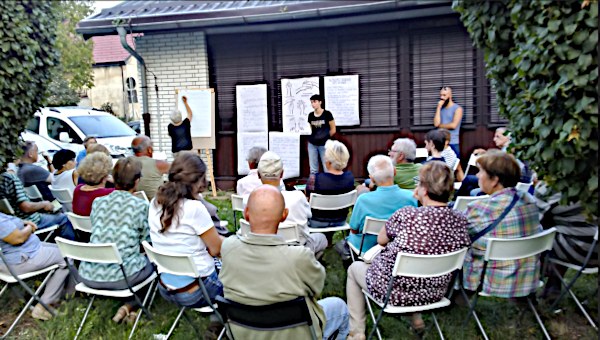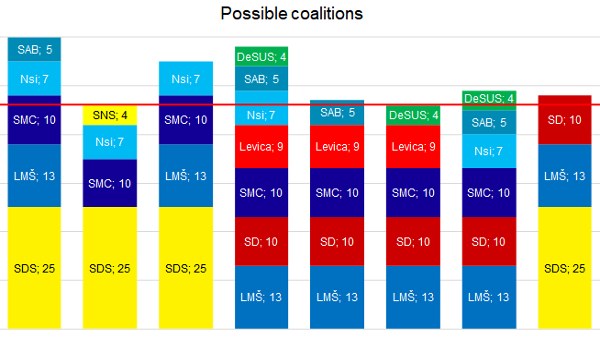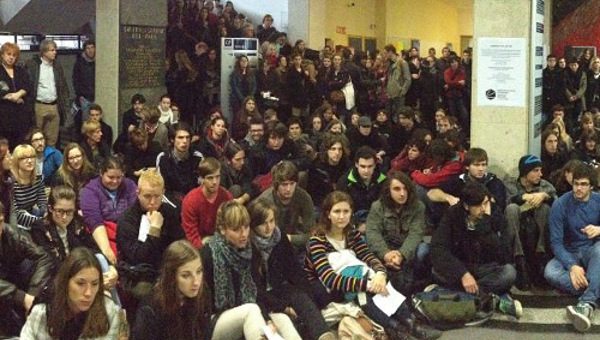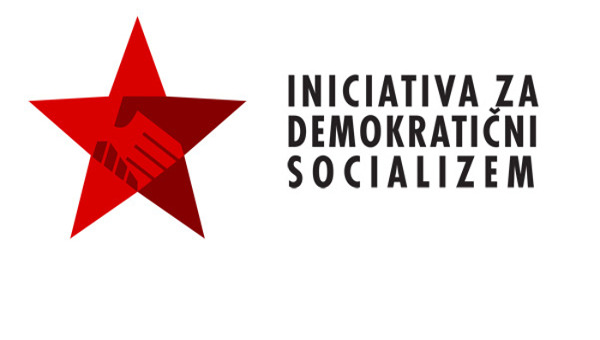Initiative for Democratic Socialism
Only a few years ago anyone advocating socialism in the Slovenian public media was seen either as an old nostalgic decrying “good old times” and Josip Broz Tito (leader of the former Yugoslavia), or as a leftist extremist, who in the political spectrum does not sit far away from the extreme right-wingers. Due to the tragic break-up of socialist Yugoslavia in early 1990s, socialism and Marx have long remained buried in the dustbin of history, or in the best case limited to scarce theoretical discussion within alternative circles. The dominant ideology – transitology and historical revisionism – in the post-Yugoslav context prescribed amnesia to the recent socialist past, or criminalized it as a “totalitarian” and “gloomy,” while at the same time releasing the very same transitologists from the responsibility of the consequences of the so-called “democratic” transition.
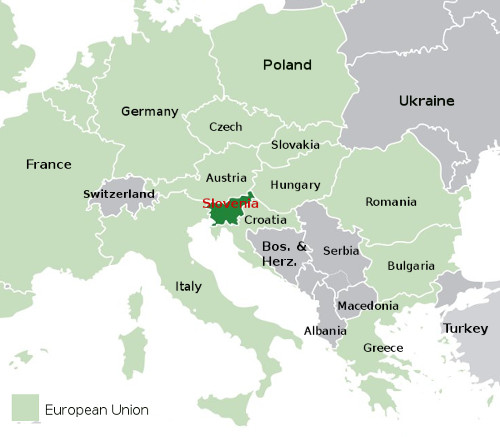
Let us not forget that it was precisely transitology with all its liberal advocates that pushed for, and with, conservative forces, unified under the banner of nationalism. The civil wars in early 1990s in ex-Yugoslavia were not fought in the name of an “artificial entity” of socialist Yugoslavia – which for a few decades sustained a relative economic and socially prosperous material standard and industrialization in the region – rather, the civil wars were fought in the name of a new project: the building of new nationalistic states.
Let us not forget that the newly and democratically elected political parties were those that pushed people into wars. The transition to the “free,” “democratic” and “market society” in Yugoslavia resulted in the politics of ethnic cleansing and the variable speeds of the capitalist reorganization of the economy that produced, on the one hand, a mass of displaced, murdered, missing, erased, refuges, and on the other hand a mass of dispossessed, de-industrialized and unemployed reserve army. A veritable social, economic and political disaster – to take up a term proposed by Alain Badiou.
Short-Lived Success
Evidently, in this period Slovenia was “lucky” to escape the most catastrophic effects of the wars; moreover, in parts of the transitology literature and in the self-justifying mythology of the dominant class, Slovenia was described as a success story of transition. But this success, not only was it short-lived, it also cannot be ascribed to a particular invention of the local political elite, which among other things was in the early 1990s stopped by mass protests that did not allow the introduction of the shock doctrine. More importantly, we should acknowledge the relative welfare prosperity in the 1990s due to Slovenia’s privileged economic position within Yugoslavia, the existing trade (export) relationship with Western Europe and only a very brief military conflict in July of 1991.
Nonetheless, in the 2000s and after the accession to the EU, foreign economic pressures, the crony local capitalist class and corrupted political elite, the success story fell apart like a house of cards. After 2004, the Slovenian economy entered the second wave of privatization and progressively adopted a neoliberal agenda that targeted the whole public, social and cultural infrastructure. In this perspective the existing political parties carried almost an unanimous answer to the new European “challenges”: the reform of the welfare state was deemed necessary, it became necessary to weaken trade unions, the economy needed to be more open to “foreign capital investment,” labour market made more flexible, while the low bank credits from the core of the EU boosted excessive investment projects. There were no autonomous governmental policies, or rather these policies only followed and accommodated European directives and capitalist logic.
Instead of joining the demands of the trade union movement in the mid 2000s, which presented the only real political opposition to neoliberal capitalism, the two major parties that have been alternating in the coalition governments, the right-wing Slovene Democrats (SDS) and so-called left-centre Social Democrats (SD), have only cared to reproduce and solidify their own political positions. On crucial political topics the existing dominant parties have always been in complete agreement: they have been supporters of major “national projects,” integration into NATO and the Eurozone, dismantling of the welfare state, targeting of trade union organizations, the flexibilizing labour markets, etc. Most recently and also most obviously, the dominant existing parties have wholeheartedly supported the troika’s recommendations and begun implementing austerity packages on their own! Being more Catholic than the Pope! This means that currently we witness a mass sell off of all valuable and profitable industrial capacities that were partially or in large degree still in the hands of state or parastate funds, while at the same time, the state tightens the belt around all social agencies, especially in the higher education and health system there are pending reforms, which are currently being met with protests.
Winter 2012: Mass Uprising and Formation of the Socialist Alternative
Dramatic cutbacks and the mass unemployment that hit Slovenia in 2012/2013 brought the people into the streets. Mass protests first hit in Maribor, and then spread to all other cities.1 For the first time since late 1980s, a veritable democratic eruption of more or less spontaneous protests from below unfolded. Protests were not organized by opposition parties or trade unions, but by many social groups and individuals with different political affiliations and generations, young and old, workers and students, LGBT activists, precarious workers, ecologists, anarchists and socialists. All these political groups demanded a deeper social change, but primarily they were united around the same political slogans that were directed especially against the ruling politico-economic class: “It is enough! It is over for them!” [Gotov je! Gotovi so!]. Protests were directed against austerity politics and after the mayor of Maribor resigned, most political energy was mobilized against the right-wing government of Janez Jansa, who in March 2013 also resigned from the post and is currently on trial for corruption charges. Unfortunately, after the overthrow of Jansa, apart from some radical left and other political initiatives, most people stopped protesting and rather waited and hoped that the measures of the new “transitional” government might turn in a more moderate direction.
From Initiative to Party of Democratic Socialism
However, the austerity policies and neoliberal solution to the crisis continued. For many within the mass protests all across Europe it was clear that the struggle on the street needed to be complemented with the struggle in official institutions. This assessment should in the Slovenian context be complemented by the absence of a left political force and the absence of any intellectual work that would challenge the prevailing “trends.” The whole concert of existing parties reduced politics to management for capital, local clientelism, whose success is occasionally measured by opinion polls. All this taken into account, the 1st of May 2013 saw the establishment of the Initiative for Democratic Socialism (IDS). This organization brought together activists, students and researchers that had been involved in many spheres of activism in the recent and less recent past: from the anti-globalization movement and campaigns against Slovenia’s entry into NATO to movements addressing the precarity of migrant and adjunct work, student struggles against privatization and trade union activism. The most immediate goal of the IDS was to bring into public discourse a new vision of socialism and to extend the grassroots political organization that would mobilize around a socialist inspired agenda. The initiative became further engaged on different political fronts: from the defence of public and free education for all, to public health services, and to public presentations and interventions in media and cultural centres across Slovenia.
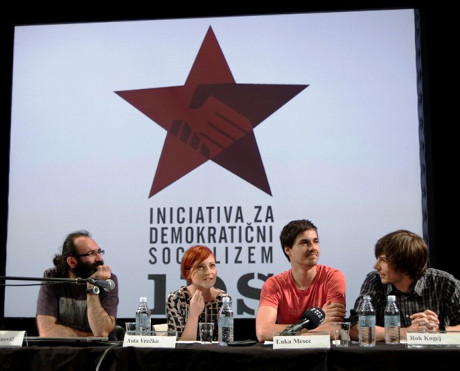
During the political process it became clear that serious and long-term political intervention in the current situation necessitates a more integral programmatic agenda, and also the creation of a political party that apart from the work on the grassroots level needs to launch its struggle on the more formal level. As mentioned, the left political space has been long evacuated, and the time of mass protests and discontent seemed ripe to form a party. On the 8th of March 2014 the inaugural congress of IDS took place in the Centre of Spanish fighters. The date as well as the place of the congress was not chosen by coincidence. International Women’s Day instead of its simple celebration needs to stress the current predicament, where we witness a wholesale attack on women’s social and economic rights. Also, the decision to hold the founding congress in the centre devoted to the memory of fighters in the Spanish civil war is not coincidental. If the late 1930s saw the idea of internationalism materialize in international brigades that consisted of 30,000 volunteers from more than 50 countries (among them 1600 Yugoslavs), this spirit needs to be strengthened even more today in the light of the extreme-right.
The 8th of March congress brought together around 300 members, where a large majority consisted of young members in their 20s and 30s. As mentioned already, many of the political activists were engaged in the recent student movements and mass uprising. This is the new political generation that is not burdened by the legacy of the end of Yugoslavia and nationalist mythology. Apart from the new faces, IDS wants to also promote principles that are non-hierarchical rather than those usually connected to the party structure/tradition. IDS does not have a president, instead it has a coordinator that is a legal representative who is in charge of connecting the work of other coordinators (for international relations, for the economic program, regional expansion, for agriculture, ecology, etc.). The real political power is vested in the council, which is directly elected yearly at the congress and has the greatest power and authority in between the congresses. The council consists of 31 members that are elected directly by the congress and 26 members that are delegates of local branches of the party.
The idea behind such a structure is that power is as dispersed as possible and that every member of the party has an opportunity to participate in the process of party development. Organizing the local initiatives, connecting to social movements and other progressive forces will remain the key aspect of IDS, while in terms of the program one should mention at least a few key points that are directed at overcoming of the capitalist crisis: reclaiming and further developing the quality of public services for all; the introduction of multiple forms of direct democracy (e.g. participatory budget, right to the city, users’ democracy); establishment of economic democracy (e.g. cooperatives, workers’ self-management); economic policy that strives to environmentally sustainable development and full employment with a shorter working day; the raising of the minimum wage up to 70 per cent of the average wage; the transformation and socialization of banks; and last but not least the increasing progressivity of taxes. Some of these points need to be addressed in the local and national context, while other on the European and even global arena.
Founding of the United Left in Slovenia:
Tsipras’ bid for the EU Commission
The international dedication and rethinking Europe in a more radical vein has been on the agenda of the European Left Party (EPL), and this is why IDS together with two other extra-parliamentary alternative parties TRS (Party of Sustainable Development, eco-socialists) and DSD (Democratic Party of Labour), decided to found the coalition of the United Left. This coalition was formed to participate in the European elections. In early March 2014, Alexis Tsipras from SYRIZA visited the founding congress of the United Left, which sparked lively discussions in public media and pointed to the formation of a veritable alternative to the existing political parties.
The Slovenian United Left joined the European Left party and politically demarcated itself against both the extreme right-wing eurosceptics that want an ethnically pure and folkloristic Europe, and also against the current existing conservative-social democratic “coalition,” which has been imposing the neoliberal policies for the last few years and left millions of insecure and unemployed all across the periphery. Only with multiple political pressures from below and above can we make the real alternative for a future Europe. The clear political, social and economic program is at this point not completely adopted in EPL, also, the signifier “socialist” is not clearly present, but what does exist is a strong commitment and will for social change. •
This article was first published on the chronosmag.eu website.


